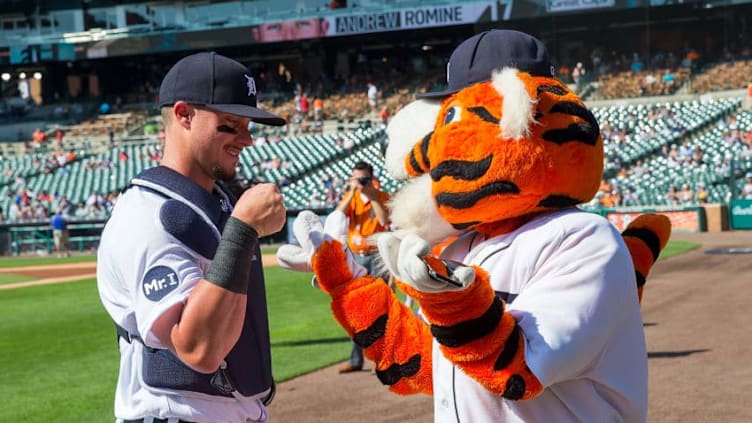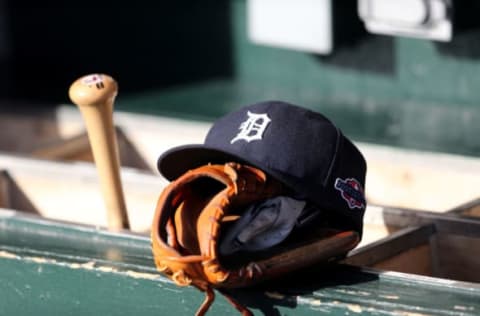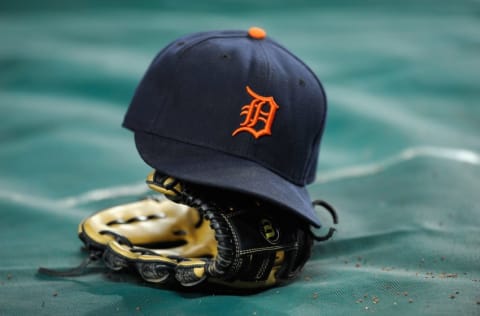Detroit Tigers: The Tigers who wore stripes


For some Detroit Tigers, ascending into the big leagues was God’s blessing. To others, it was a descent into Hell.
The Detroit Tigers are nearing the start of another season in their storied history. The boys of Detroit have a rich history, with thousands of unique characters. The following article follows the story of three of the most unique ballplayers in Detroit Tigers history. This trio spent time not just wearing the orange colors of the Detroit Tigers, but also the orange jumpsuit in the prison system. Our own Jim Kramer takes a look at three Tigers players who were, at one point, prisoners.
Baseball fans sometimes look at major league players with envy and some with respect and adulation. Others with dismay.
This article chronicles the uplifting stories of Gates Brown and Ron LeFlore while investigating the dismal fall of Denny Mclain.
First up is one of the most well-known Detroit Tigers of the 1960’s, pinch-hitter extraordinaire Gates Brown.

Gates Brown
The left-handed batter spent his entire major league career in a Detroit Tigers uniform (1963 to 1975). But things were not all roses for the young Brown.
Growing up in a small town in central Ohio, Brown ran with a rough gang. He was eventually sentenced for burglary. He served time in the Ohio State Reformatory. While imprisoned, a jail guard who served as a baseball coach convinced Brown try out for the prison team. Brown excelled.
Word spread of Brown’s ability at the bat. In spite of interest from numerous clubs, he would eventually sign with the Detroit Tigers.
After an early parole, assisted in part by the Detroit Tigers, the “Gator” made his Major League debut as a 24-year-old rookie. In his first at-bat Brown became the 11th player in Major league history to hit a home run.
That initial hit would be indicative of the long career ahead of him. Brown retired in 1975 as the most prodigious pinch hitter in MLB history.
Brown had a total of 16 pinch home runs and 107 pinch hits in his illustrious career. As a part-time outfielder, first baseman and designated hitter Brown posted a .257 average while hitting 84 home runs and 322 RBI.
In the 1968 championship season Brown had a batting average of .370 with an OBP of .442.
After his retirement, Gator went on to be the Tigers hitting coach. He acquired his second World Series ring as the hitting coach for the 1984 Tigers.
The Hot Dog Incident
Although the story has been told many times, it was given its proper place in MLB baseball lore in an article written by MLB.com titled “Great Moments in Hot Dog History“.
On August 8th,1968, Brown found himself hungry and not in the daily line up. To satisfy his ravenous hunger, Brown decided to buy two dogs with everything on ’em.
After wolfing down the first, and while sitting on the bench, Gator heard his name being called on by manager Mayo Smith. Brown was being called on to pinch hit.
Never one to throw away good food, Brown shoved the second dog, condiments and all, into his uniform. To Brown’s dismay, he not only got a hit but had to slide into second base for an extra base hit.
After crushing the dog inside his uniform, catsup bled through the jersey. An ump thought Brown had injured himself and told him to stay put until the trainers arrived.
Players on the field quickly realized what was happening and started laughing. When manager Smith realized what happened, he fined Gator $100.
So the legend of the hot dog incident was born.
Gates Brown died in Detroit on September 27, 2013.

Ron LeFlore
The man behind the movie One in a million: The Ron LeFlore Story, started life on Detroit’s East side. He too ran with a rough crowd and spent his youth getting into trouble while becoming a heroin addict.
After first being arrested at age 15, he ultimately was sentenced to Jackson State Prison to a term of 5-to-15 years. The crime was armed robbery.
While incarcerated LeFlore played baseball.
His prowess on the field, ultimately, sparked interest in Detroit Tigers Manager Billy Martin. In May of 1973, the Tigers arranged to have LeFlore tryout at Tiger Stadium.
The tryout was successful and LeFlore signed a contract with the Tigers. He was assigned to Class A Florida State league. The contract was in line with conditions of his parole.
Leflore made his major league debut in 1974, and by 1976 LeFlore was an All-Star. While Leflore was a good hitter, stealing bases was his specialty.
After playing for three teams, he retired in 1982. He finished with a cumulative .288 batting average, .342 OBP and 455 stolen bases. He still holds the Montreal Expos/Washington Nationals team record for stolen bases.
After retirement, LeFlore ran into trouble once again for failure to pay child support. He complied with court orders for payment and continued to pursue a career in baseball related activities.
In 2011, LeFlore had his right leg amputated, from the knee down, as a result of arterial vascular disease.
LeFlore currently resides in Florida.

Denny McClain
The cocky young ballplayer was an exceptional pitcher almost from day one. Denny McClain was initially signed out of high school as an undrafted free agent by the Chicago White Sox. Left unprotected, the Detroit Tigers acquired McClain off waivers in April of 1963.
McClain played 10 years in the Major Leagues for the Tigers, Senators, Athletics and Braves. His years with Detroit were spectacular. Aside from the World Series Championship in 1968, McClain garnered an AL MVP, 2 AL Cy Young awards, be a two-time AL wins leader and was voted an All-Star three times.
McClain’s most notable achievement was winning 31 games as a pitcher in 1968. That feat had not been accomplished since 1934 and has not been done since. With rotations as they are today, a 31 game winner may not be seen again in MLB.
McClain was accused of pitching an intentional “fat” pitch to his boyhood hero Mickey Mantle. Mantle hit the ball out of the park for the last home run of his illustrious career.
McClain was also a talented musician and would often play clubs in downtown Detroit. He also released two record albums and was a headliner in Las Vegas Casinos, and appeared on many television shows.
Aside from being on the cover of Time Magazine, he was also selected as Associated Press Male Athlete of the year in 1969.
For all his talents, McClain was an apparently bad gambler. When articles were released in two nationally published magazines highlighting his gambling activities, he was suspended from baseball.
Numerous incidents in Detroit led the Tigers to trade McClain to the Washington Senators. His career was never the same. McClain continued to create problems and was once again suspended from baseball by commissioner Bowie Kuhn.
Arm trouble continued to haunt McClain and he saw an end to his baseball career in 1972 at the age of 29.
TROUBLE with the Law
After leaving Major League baseball, McClain played the organ at downtown Detroit bars and clubs. He also continued to play ball for the London Majors of the Intercounty Baseball league and batted .380 as an infielder.
Once he left the ball field his weight increased to 360 lbs. He began a somewhat successful radio talk show which was ultimately cancelled after a demand for more money.
Gambling became his main source of income. He was rumored to have accepted $160,000 by flying a wanted felon out of the States.
He was ultimately imprisoned for drug trafficking. embezzlement and racketeering. Even though that case was subsequently reversed he did not learn a lesson. He was once again convicted of embezzlement, mail fraud and conspiracy and spent six years in prison.
Next: The Forgotten 1972 Detroit Tigers
Today he lives in the suburbs of Detroit and can be seen peddling signed baseballs and his book at minor league stadiums throughout the eastern USA.